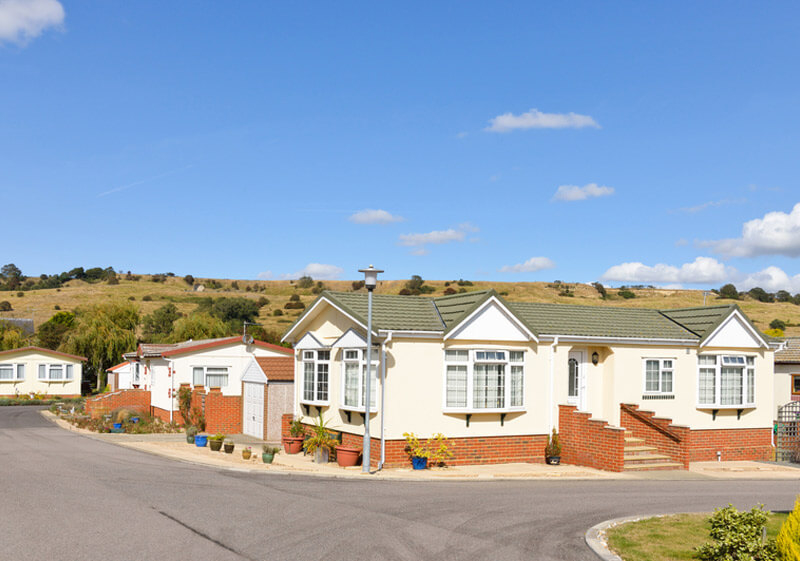For those of you not familiar with the Chinese art and science called “feng shui”, it is an ancient system for determining how people are affected by their immediate surroundings.
Like “astrology for architecture”, when a house is built combined with its compass orientation, will reveal the house to have a certain personality or predictable influence on those who live inside. The real beauty of feng shui is that there are often remedies which can correct an unbalanced environment and make it good for health, relationships, and even financial potential.
For example, a house that faces south and built in 1950 can contribute to an occupant having eye or heart problems. An east-facing house built in 1970 could cause the occupants to have fertility problems. Now, can a mobile/manufactured home be diagnosed the same way? Technically, the mobile home is not “attached” to the ground like a house with a slab foundation. And what happens if the mobile home is moved to another location or actually used occasionally for travel?
Part of the theory behind feng shui includes the belief that energy from the ground rises up when a house is under construction. Then, when the roof goes on, that seals the unseen energies in the house and there can be a similar influence for many decades on whoever lives in that house. Like a car or boat, the mobile home is not actually “plugged into” the earth.
Many mobile homes are built just for the purpose of being residences and not actually for traveling. Whether it is assembled on the lot or driven onto the lot, once the mobile home is stationed in a definitive location, it will still absorb the same energies from the earth it covers — as if it were like any other house. This is surprising to many practitioners because it seems to defy some of the stricter theories about how the feng shui energies get activated during a construction. If that mobile home were to be moved, it would really be similar to a regular house being moved, which does happen although not often. Once the structure is plopped back onto the ground again, then a new energy field gets created eventually. I have reviewed a number of Tiny Homes which have a similar distinction. A Tiny House or a mobile home, not planted on a slab foundation, can be viewed similarly to a traditional house on a raised foundation. The house is close enough to the ground in order to absorb the earth energies.
Some practitioners would argue that this is not possible and that the flying stars are a blending of both earth energies and Sun energies. If the manufactured home was never open to the sky while under construction, or under construction on the land it later occupied, that there is a major missing ingredient. This may be true on one level, but there are other levels to consider, in the same way that we can use a flying star chart for raw land in order to determine where to even place the structures. We can also utilize other schools of Feng Shui besides the Flying Star School in order to evaluate a Tiny Home or a Manufactured (mobile) home.
Because mobile homes are largely made of metal, it is also vital for anyone taking a compass reading, to stand at least 10-20 feet away from it so as not to interfere with an accurate compass reading.
Aside from the question of how a mobile home can connect with the earth, other aspects of a mobile home could be seen as very ordinary and easy to diagnose using feng shui principles. In other words, there is nothing inherently good or bad about living in a mobile home and the same remedies that work for regular structures can also work in the mobile home.
There are however, a couple of situations the practitioner needs to be mindful of. Firstly, the mobile (or manufactured) home might be made with fiberglass in the walls or made of metal. The metal is a conductor for electrical fields, so those who are sensitive to EMF’s may not feel very good in a home with so much metal in the construction materials. To that extent, even if a person does not feel nauseous from the EMF’s, they may still be taking their toll on the occupant. With pervasive wi-fi and cell towers, a person would be just as disturbed in any kind of dwelling and “Smart Home.”
The question of orientation can also be an issue with mobile or manufactured homes. Some of them have more conventional floor plans than others, where the sitting and facing sides are obvious and often the mobile home just faces the street it is on. This is more conclusive when the living room is on the street side and the bedrooms are on the back of the lot. For the single-wide mobile home, there can be a bedroom on each end with the living room and kitchen in the middle. Another variation of the floor plan is to have a kitchen on one end and a bedroom on the other. Both of these types of rooms have historically been considered “yin” rooms, but the way people live today is different than in ancient times, so we have to see what is relevant for the way people live nowadays. Rooms have their own distinctions of being “yin” of “yang” and that comes into play when determining the orientation of a mobile home. Combined with the outside environment, we come to realize that the location of the mobile home’s door is secondary in determining the facing side. A door on the long side of a mobile home is not necessarily the facing side.
Author: Kartar Diamond
Company: Feng Shui Solutions ®

